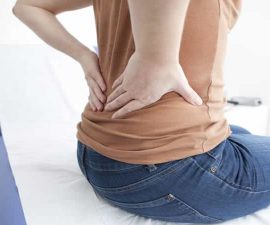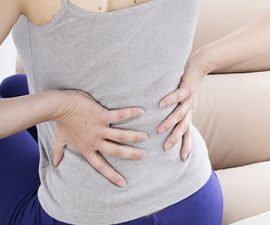When you have hiatal hernia, a condition in which the upper part of the stomach bulges up through a weakness spot or an opening (hole) in the diaphragm, what you eat can help a lot to cope with the disease. For example, some foods can drive more acid production in the stomach. If the amount of your stomach acid is higher than normal, the acid can push upward more easily. This acid reflux may irritate the esophagus and make your hernia symptoms worse.
Hiatal hernia irritating foods to restrict!
No one knows exactly what causes the disease. But in general, it is often associated with frequently pressure on the abdominal cavity (for examples if you have chronic coughing and frequent lifting of heavy objects) and age-related changes in the diaphragm.
Treatment is not always necessary since hiatal hernia is usually small and doesn’t cause any symptom. But sometimes it can become large and cause a number of symptoms. The symptoms vary, but the main ones are as follows:
- Heartburn, a burning sensation in the throat and chest. Typically, it’s caused by acid reflux (when stomach acid backs up through the esophagus sphincter). With a hiatal hernia, the esophagus sphincter doesn’t close tightly, allowing more acid to back up into the esophagus.
- Pain or other discomforts in the chest (especially in the esophagus and upper stomach). A hernia can be painful if abdominal tissues protrude through the hole. More abdominal tissues that protrude and get momentarily stuck in the hole, more painful it is.
- Swallowing difficulty, belching, feeling of fullness, or sometimes vomiting blood (in severe cases).
Treatment is usually required when the disease has caused symptoms. The treatment goal is usually to help relieve the symptoms. Fortunately, the symptoms often relieve and become controllable with non-surgical treatments. Even sometimes some lifestyle measures are enough to soothe the symptoms.
Since pain, discomforts, and other symptoms of the disease is often caused by the upward flow of stomach acid and the weakened esophagus sphincter – keeping your stomach acid in balance is the key. So restrict foods and drinks that can worsen your acid build-up!
Here are some common culprits to restrict:
Acidic fruits
These include oranges, lemons, grapefruits, lemonade, and acidic juices. It’s ok to eat them in moderation since they are also high in some essential nutrients – also, make sure they’re ripe enough to eat.
But when your hernia symptoms flare up, you may need to avoid them for a while! Consider alternatives that are less likely to cause elevated amounts of stomach acid secretion such as apples, pears, avocados, and ripe bananas.
Spicy and fatty foods
Spicy foods are not always the worst culprit since they don’t always cause acid reflux. But they are hot and may simply irritate the fragile-lining of your stomach and esophagus. The same goes for fatty foods, they also tend to irritate.
This doesn’t mean your diet must to be bland! Just keep your diet gentle on the seasonings (including from garlic and onions) and light on the fats. Avoid very spicy and fatty foods such as buttery pastries and creamy sauces! Choose also non-fat/ low-fat ingredients!
Restrict oily-fried foods, cream sauces, and go easy on butter. Instead, choose alternatives such as baked, roasted, or grilled foods. Replace also high-fat dairy products with low-fat dairy products!
Furthermore, the temperature of your food may also have an effect. Make sure to eat food at safe temperature level – not too hot or too cold! Too extremes may irritate your esophagus and stomach lining.
Caffeine and alcohol
Both caffeine (including tea) and alcohol could also irritate your stomach and esophagus, making your hernia symptoms worse. This is especially true if you drink caffeine and alcohol with empty stomach.
You can have a spike in your stomach acid level if you have not eaten anything and then drink alcohol or caffeinated beverages. For many people with hiatal hernia, it’s still OK to drink caffeine and alcohol as long as they do this in moderation. But if the symptoms of the disease flare up, it’s better to stop drinking until the symptoms relieve.
Tomatoes and tomato-based foods
Tomatoes contain malic and citrus, two types of acids that can worsen acid reflux. However the effect of eating tomatoes can vary from person to person. But if you do find that tomatoes can worsen your hernia symptoms, the best advice is to avoid them. Consider alternatives such as green beans, carrots, broccoli, or peas!
What else?
Other foods that might cause irritation and drive more acid secretion in the stomach are as follows:
- Chocolate, spearmint, and peppermint.
- Whole milk, creamed foods, ice cream, and other dairy products.
- Cola, carbonated or soft drinks.
Constipation is common in people with hernias. It can cause your bowel movement harder than usual and therefore you may need to strain more to pass stools. To prevent and treat constipation, restrict the following foods:
- Dairy products, fatty and fried foods.
- Frozen dinners, they are usually high in fat and low in fiber.
- Potato chips, which usually high in fats and salt.
- Products containing refined carbohydrates such as cookies, crackers, and pastries.
- Unripe-green bananas.
And since most things that cause excess pressure in the abdominal cavity are bad for the prognosis (outcome) of a hernia, restricting foods that cause abdominal bloating (discomfort sensation of extra pressure inside the abdomen) might also be worth a try. Common culprits of abdominal bloating are foods high in salt, sugar, and fats.
What else to remember?
But there is usually no single food that stands out. Sometimes the same food can worsen the symptoms after one meal but not after others. And since what kind of food that worsens the symptoms can also vary from person to person, it’s recommended to write down a food diary for several weeks so you can identify the real ones that provoke your hernia symptoms.
A few other lifestyle changes may also help manage the symptoms and prevent the disease from worsening. Here are some helpful recommendations:




